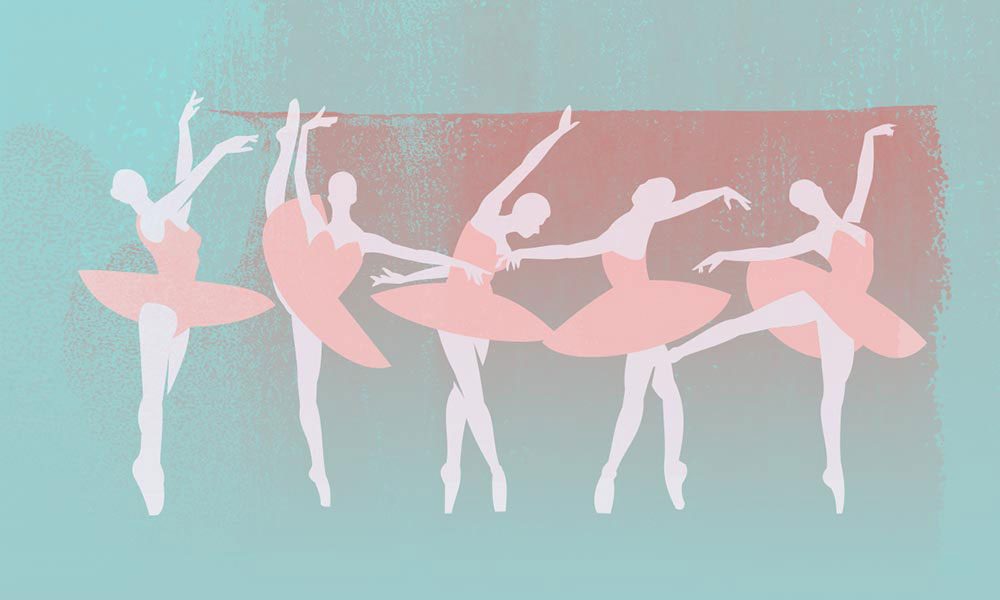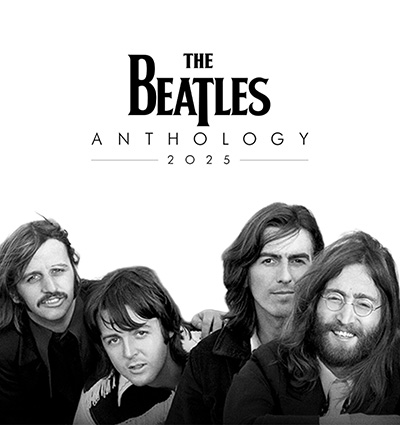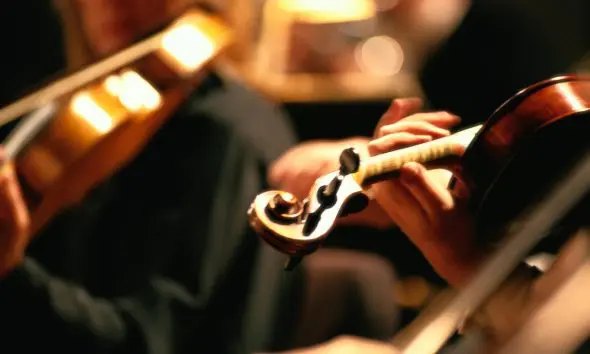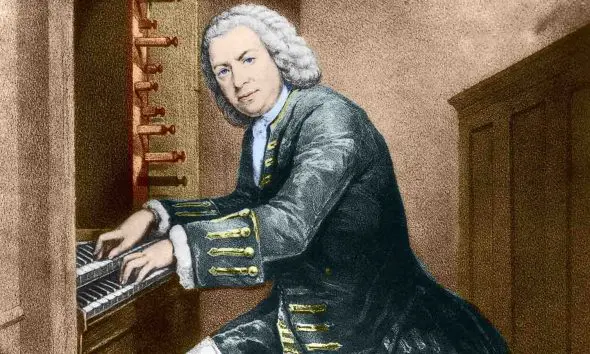‘Swan Lake’: Masterpiece Guide To Tchaikovsky’s Romantic Ballet
Read our guide to Tchaikovsky’s romantic masterpiece ‘Swan Lake’ – one of the greatest and most popular classical ballets.

Swan Lake is one of the most popular of all classical ballets, and the first of Tchaikovsky’s three ballets (the others being The Sleeping Beauty and The Nutcracker) that opened a golden age of Russian ballet. It is a romantic ballet in four acts composed between 1875 and 1876 and first performed on 4 March 1877 at Moscow’s Bolshoi Theatre with choreography by Julius Reisinger. However, what is most usually seen today is a revised version of the score with choreography by Marius Petipa and Lev Ivanov which premiered at St Petersburg’s Mariinsky Theatre on 27 January 1895, two years after Tchaikovsky’s death.
Listen to our recommended recording of Tchaikovsky’s Swan Lake, featured on Tchaikovsky: Ballet Suites performed by the Berlin Philharmonic conducted by Mstislav Rostropovich, on Apple Music and Spotify.
Swan Lake: Masterpiece Guide To Tchaikovsky’s Romantic Ballet
For such a famous work the genesis of Swan Lake, the greatest of all romantic ballets, is surprisingly vague. Every summer, Tchaikovsky was in the habit of visiting the same three places and friends. It was in these locations that he wrote the Second and Third Symphonies, and Swan Lake. Family lore records that there was a house production of a ballet called The Lake Of Swans in the summer of 1871 which Tchaikovsky wrote for his nieces and nephews. It was performed at the country estate of Tchaikovsky’s sister Alexandra Davydova at Kamenka (in Ukraine). One informant claimed that the ‘swan theme’ familiar from the later ballet made its first appearance at this time; another claimed that the production had taken place in the summer of 1867.
There is also uncertainty about who provided the libretto for the ballet. Russian culture has always drawn heavily on fairy tales but the two or three often cited as possible sources for Swan Lake bear little resemblance to the story that is danced on stage. One theory has it that Reisinger provided the libretto, another says that it was Vladimir Begichev, director of the Moscow Imperial Theatres, in collaboration with the dancer Vasily Geltser. There is no literary source cited in the printed libretto.
Tchaikovsky studied the music of ‘specialist’ ballet composers
We do know, though, that it was Begichev who commissioned the score in May 1875 for a fee of 800 roubles. We also know that before setting to work, Tchaikovsky studied the music of ‘specialist’ ballet composers like Cesare Pugni (1802-70) and Ludwig Minkus (1826-1917) whose light, rhythmic, melodious but vapid works were in great demand. The two composers whose ballet music he most admired were French: Adolphe Adam and Leo Delibes. Adam’s 1844 Giselle, still one of the most celebrated in the repertoire, was Tchaikovsky’s favourite ballet. Adam uses leitmotifs – the technique that associates certain musical themes with particular characters and emotions, a device that Tchaikovsky adopted for Swan Lake and The Sleeping Beauty. As for Delibes, Tchaikovsky later wrote to his protégé the composer Sergei Taneyev that he “listened to the Delibes ballet Sylvia… what charm, what elegance, what wealth of melody, rhythm and harmony. I was ashamed, for if I had known of this music then, I would not have written Swan Lake.”
Between 18 July and mid-August 1875 Tchaikovsky finished his Third Symphony and wrote two acts of Swan Lake. The score was finally completed in April 1876. Unlike The Sleeping Beauty, composed more than a decade later, there was little communication about the details of the music between Tchaikovsky and the ballet master, Reisinger. Curiously, there is no record of Tchaikovsky’s involvement with the ballet during its rehearsal period through much of 1876, though he was living in Moscow at the time. Moreover, the score for Swan Lake allows the ballet master free rein to repeat or delete sections at will. No rehearsal material or performance score survives.
Principal Roles
The principal roles are:
Odette (aka Queen Of The Swans and The White Swan), who has been transformed into a white swan by Rothbart
Prince Siegfried, a handsome Prince who falls in love with Odette
(Baron Von) Rothbart, an evil sorcerer, who has enchanted Odette
Odile (The Black Swan), Rothbart’s daughter
Benno (von Sommerstern), the Prince’s friend
The Princess (aka Queen Mother), Prince Siegfried’s mother
Wolfgang, his tutor
Though different productions present differing versions and interpretations of the story, the essential elements are constant:
Act 1 – A magnificent park before a palace
Prince Siegfried is celebrating his coming of age. Wine flows, Wolfgang flirts, everyone dances. The festivities are interrupted by The Princess who, worried at her son’s carefree lifestyle, announces that he must choose someone to marry by the following evening. The Princess departs, the celebrations resume, but Siegfried is, understandably, miserable at the thought of being unable to marry for love. Night falls. Benno tries to lift his friend’s mood and when Siegfried sees a flock of swans fly overhead, he suggests they go hunting them.
Act 2 – A lakeside clearing in a forest near a ruined chapel
Separated from his friends, Siegfried arrives in the clearing just as the swans fly overhead. He takes aim with his crossbow but freezes when one of them transforms into a beautiful maiden – it was the swan he was on the point of killing. She is Odette who explains that she and her companions are victims of a spell cast on them by the evil Rothbart whereby they are turned into swans during the day, only returning to human form at night by the enchanted lake. The spell can only be broken by someone who has never loved before and swears to love Odette forever. The swan maidens appear in the clearing. Siegfried breaks his crossbow and declares his eternal love for Odette. But dawn breaks and the spell turns her and her companions back into swans.
Act 3 – A magnificent ball at the palace
Guests arrive, six princesses are presented to Siegfried as candidates to be his bride. He chooses none. Then Rothbart enters with his daughter Odile whom he has transformed to look like Odette. Of course, Siegfried has eyes only for her, whereupon Odette appears and attempts to warn him of the trick, but he does not see her and announces that he will marry Odile. Rothbart gives Siegfried Odile’s hand and then shows him a magical vision of Odette. Realising his mistake, Siegfried flees grief-stricken to the lake.
Act 4 – At the lakeside
Odette, comforted by her swan maidens, is distraught. Siegfried arrives and begs her forgiveness. This she grants him but his betrayal means that the spell cannot now be undone. A storm arises. Rather than live forever as a swan, Odette chooses to die. Siegfried chooses to die with her and, falling into his arms, they vanish beneath the waters (or, in some productions, rise to the heavens in an apotheosis). Rothbart’s spell over the swan maidens is broken. He has lost all his evil powers and dies. The storm subsides, the moon comes out and a band of swans appear on the tranquil lake.
Tchaikovsky’s magnificent score of Swan Lake was revolutionary
Today, we take Tchaikovsky’s magnificent score of Swan Lake for granted but it was revolutionary in its time. There are 33 numbers in the complete ballet scored for a large symphony orchestra (five instruments more than the pit orchestra for Tristan Und Isolde, for example). No longer was the music a string of unrelated dance movements with no attempt to portray characters or events on stage, as was usual in the fare provided by the ‘specialist’ ballet composers. Apart from a full symphonic score, Tchaikovsky offered moments of magical orchestration too numerous to mention, and, with the sophisticated use of different tonalities, links the various elements of the narrative into a cohesive whole (using B minor for the Swans, for instance, F minor for Rothbart).
The premiere of Swan Lake was a fiasco
Yet with all this, the premiere of Swan Lake on Friday 4 March 1877 at the Bolshoi Theatre, Moscow, was something of a fiasco. The conductor was incapable of doing justice to so complex a score, the scenery and choreography were second-rate and, to cap it all, the brilliant ballerina Anna Sobeshchanskaya, for whom the main role of Odette had been intended, was removed after a senior official in Moscow accused her of agreeing to marry him, taking all the jewels she received as gifts, selling them, and then running off with a fellow dancer. “The poverty of the production,” wrote Modest Tchaikovsky, the composer’s brother, “the absence of outstanding performers, the ballet master’s weakness of imagination, and, finally, the orchestra … all of this together permitted (Tchaikovsky) with good reason to cast the blame for the failure on others.’”
Nevertheless – and this is not often recorded- this production survived in the repertoire for six years and had 41 performances, more than many of the other ballets in the Bolshoi repertoire. But it was not until after Tchaikovsky’s death that Swan Lake achieved the success it deserved in a revised version of the score by Riccardo Drigo (1846-1930), the Italian composer, conductor and long-serving Director of Music of the Imperial Ballet of St Petersburg. Various changes to the libretto were made (see above) and the four acts became three (Act 2 became Act 1 scene 2). The new Swan Lake was given its premiere at St Petersburg’s Mariinsky Theatre on Friday 27 January 1895 and was warmly received.
One final point. One of the most celebrated parts of the whole ballet was an afterthought of Tchaikovsky’s not included in the original production but danced in the revised version. Now, Act 3 features a Pas De Deux danced by Siegfried and Odile. It ends with the famous 32 Fouettés En Tournant. This, the graceful ‘Waltz’ from Act 1, and the delightful ‘Dance Of The Cygnets’ from Act 2, are the best-known musical highlights of this great score.







Bonnie
February 23, 2020 at 1:15 am
Nice history of the music/score with attention to the embellishments, omission and changes that many, if not most orchestral pieces unto. The ballet “libretto” omits the same process with affects (or afflicts) the ballet itself.
Subject.to much argument and change is the ending; variously, Odetter kills helself in despair, the Prince either joins her or follows after her, Odette or both either rise (To Heaven) or drown ( trust me, this is important) OR THE Prince rights/kills Rothbart and Odette liveSS, rising/rescued from the lake ( coming down from Heaven is a no-no) OR the power of their love defeats Rothbart, who dies.
This causes furor among ballet lovers. Really. Stalin is blamed for the “happy”. ending, believe it or nor. Having seen more than 55 years of ballet and very very many Swan Lakes , I now vote for the happy endings. Ballet is full of horrible endings for the the lovers. It really doesn’t ruin the ballet! It’s a relief!
, they go off in bliss
Tom Powers
March 5, 2020 at 12:00 am
This is a wonderful write-up! Thanks for the marvelous details.
Pedro Fernandez
March 19, 2021 at 8:43 pm
Hi! I’m a Cuban who has seen many “Lakes” in his life, always astonished by the beauty of the music and the power of the choreography.
There was a ballerina known as Alicia Alonso, who made her version of the Lake with the happy ending and believe me, it was beautiful (and nice). But there was a more special version for the Chapultepec Lake in Mexico City -that was repeated in the Lenin’s Park Amphitheater in Havana (1983 or 1984 I think)- that was the most impressive performance I’ve seen.
Jim Stokes
July 1, 2023 at 7:29 pm
Thanks very much for the detailed explanation.